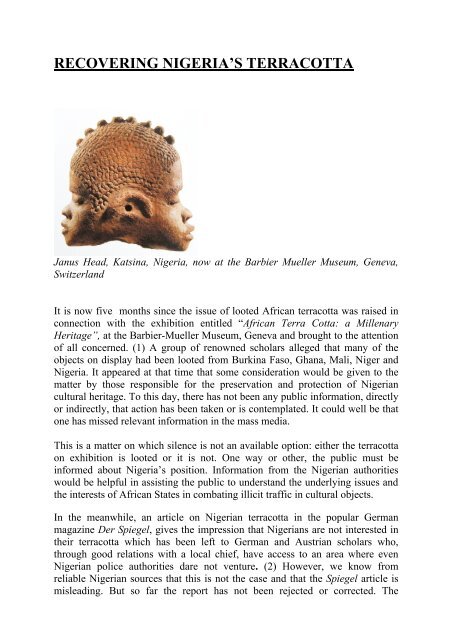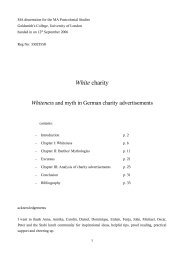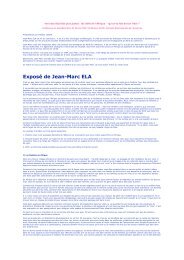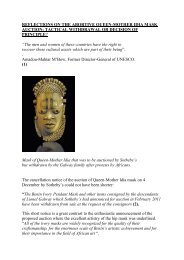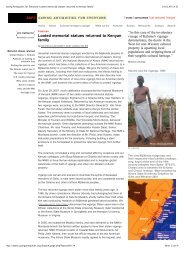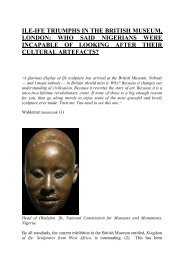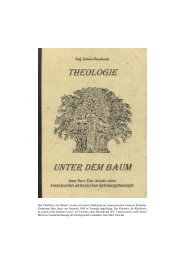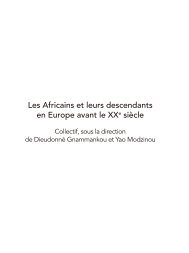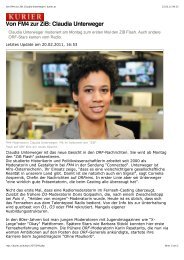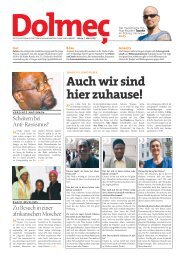RECOVERING NIGERIA'S TERRACOTTA - Afrikanet.info
RECOVERING NIGERIA'S TERRACOTTA - Afrikanet.info
RECOVERING NIGERIA'S TERRACOTTA - Afrikanet.info
You also want an ePaper? Increase the reach of your titles
YUMPU automatically turns print PDFs into web optimized ePapers that Google loves.
<strong>RECOVERING</strong> NIGERIA’S <strong>TERRACOTTA</strong><br />
Janus Head, Katsina, Nigeria, now at the Barbier Mueller Museum, Geneva,<br />
Switzerland<br />
It is now five months since the issue of looted African terracotta was raised in<br />
connection with the exhibition entitled “African Terra Cotta: a Millenary<br />
Heritage”, at the Barbier-Mueller Museum, Geneva and brought to the attention<br />
of all concerned. (1) A group of renowned scholars alleged that many of the<br />
objects on display had been looted from Burkina Faso, Ghana, Mali, Niger and<br />
Nigeria. It appeared at that time that some consideration would be given to the<br />
matter by those responsible for the preservation and protection of Nigerian<br />
cultural heritage. To this day, there has not been any public <strong>info</strong>rmation, directly<br />
or indirectly, that action has been taken or is contemplated. It could well be that<br />
one has missed relevant <strong>info</strong>rmation in the mass media.<br />
This is a matter on which silence is not an available option: either the terracotta<br />
on exhibition is looted or it is not. One way or other, the public must be<br />
<strong>info</strong>rmed about Nigeria’s position. Information from the Nigerian authorities<br />
would be helpful in assisting the public to understand the underlying issues and<br />
the interests of African States in combating illicit traffic in cultural objects.<br />
In the meanwhile, an article on Nigerian terracotta in the popular German<br />
magazine Der Spiegel, gives the impression that Nigerians are not interested in<br />
their terracotta which has been left to German and Austrian scholars who,<br />
through good relations with a local chief, have access to an area where even<br />
Nigerian police authorities dare not venture. (2) However, we know from<br />
reliable Nigerian sources that this is not the case and that the Spiegel article is<br />
misleading. But so far the report has not been rejected or corrected. The
impression created that Nigeria is not properly organized to protect its cultural<br />
artefacts from predatory Westerners and their helpers thus still remains.<br />
Is this a case where one language is used when dealing with African<br />
collaborators but for the general public, an entirely different language is used<br />
which creates different, often misleading, impressions If we look at the Spiegel<br />
article, we could think only the Germans and Austrians were interested in Nok<br />
culture and the puzzles it presents. Nigerians are totally absent from the article.<br />
Not even a mention of the National Commission for Museums and Monuments<br />
can be found. Moreover, the Nigerian Police is presented as not having the right<br />
or ability to visit the area which is described as being under the tight control of a<br />
local potentate on friendly terms with the Europeans.<br />
Do we have here the familiar pattern where Africans lead Europeans to the<br />
source of the river or the mountain and are perhaps materially compensated for<br />
their efforts But who turns out to be the discoverer of the river or the<br />
mountain Whose name is forever linked to the discovery Recognition in<br />
scientific publications is not enough. How many people read such publications<br />
Unless Africans insist energetically, loudly and openly for equal general public<br />
recognition in such enterprises, this game will go on forever. Even if such<br />
projects were financed by European entities this should not lead to their<br />
complete control over the projects and the dissemination of <strong>info</strong>rmation thereon.<br />
In the context of the present dispute over looted Nigerian terracotta, we recall<br />
the 2002 case of the Nigerian Nok terracotta which were looted and eventually<br />
turned up at the Musée de Quai Branly, Paris. The French had bought the three<br />
Nok and Sokoto terracotta knowing fully well that they must have been looted<br />
and illegally exported from Nigeria since the objects were on the Red List of<br />
International Council of Museums (ICOM).(3) The intervention of ICOM was<br />
necessary to preserve Nigeria’s ownership of the terracotta. The arrangement<br />
between Nigeria and France to loan the artefacts for a renewable period of 25<br />
years raised doubts and scepticism about the will to enforce the observance of<br />
laws prohibiting illicit traffic in artefacts. (4) Moreover, the text of the curious<br />
agreement does not appear to have been published.<br />
2
Spirit vessel Mbirhlen’nda, Ga’anda, Nigeria, now in Barbier-Mueller Museum,<br />
Geneva, Switzerland.<br />
How would the lack of vigorous public reaction by Nigerian authorities to the<br />
display of alleged looted Nigerian terra cotta be interpreted<br />
The scholars who protested against the exhibition of looted objects in Geneva<br />
would probably feel that their identification of the stolen artefacts is not very<br />
important for the Nigerian authorities who do not intend to act on their research<br />
and <strong>info</strong>rmation. They may thus feel discouraged from pursuing in future such<br />
active identification of stolen/looted artefacts.<br />
Looters of the artefacts could understand that they may continue with their<br />
activities so long as they are not caught red-handed with the objects since the<br />
Nigerian authorities will not pursue investigations on the basis of the objects<br />
successfully deposited in Switzerland and other Western countries. Museums in<br />
those States may well be re<strong>info</strong>rced in their mendacious and self-serving<br />
propaganda that they are rendering a service to art and humankind by purchasing<br />
those objects. They persistently refuse to acknowledge that by offering a<br />
lucrative market for looted objects they maintain and sustain, directly or<br />
indirectly, illegal traffic in cultural objects. (5)<br />
The Nigerian public could well understand that even though Nigeria has laws<br />
against looting of cultural artefacts, there is no intention on the part of the<br />
authorities to deprive anyone of earnings acquired from the illicit trade. (6)<br />
Members of the United Nations, UNESCO and ICOM may gain the impression<br />
that despite all statements and declarations to the contrary, Nigeria’s<br />
commitment to the fight against illicit traffic in artefacts is only lip-service with<br />
no serious intention to achieve effective implementation of the various laws and<br />
3
egulations. Some may argue that actions speak louder than words. Professor<br />
Shyllon has written that:<br />
“It is a matter of surprise indeed that to date Nigeria which at various<br />
times served on the Intergovernmental Committee for Promoting the Return of<br />
Cultural Property to its Countries of Origin or its Restitution in Case of<br />
Illicit Appropriation (she was in fact a foundation member of the Committee)<br />
has never sought the good offices of the Committee on the matter.”(7)<br />
The general public in the rest of the world may well conclude that the Nigerian<br />
authorities are not very keen to seek the return of looted artefacts. Usually, it is<br />
very difficult to know where looted objects are and who is in possession. It is<br />
seldom that we have many such objects displayed in an exhibition and in its<br />
catalogue. A lack of interest or passivity must necessarily discourage those<br />
interested in assisting in more complicated situations. As has been amply<br />
demonstrated in public opinions polls, for example in Great Britain, the general<br />
public is in favour of returning looted objects or objects acquired under dubious<br />
circumstances. (8) Interested States must encourage or at least, not discourage<br />
this sympathetic public.<br />
In his excellent article on the Benin invasion by Britain, Prof. Akin Oyebode<br />
mentioned Zik’s reference to the “manifest destiny” of Nigeria. (9) This was a<br />
phrase used often in the days preceding and following Independence. In those<br />
days, the average school pupil understood that given its size, resources, both<br />
human and natural, that great country was destined to play an important role on<br />
our continent and thus contribute to shaping the world and the future of the<br />
African peoples. But this manifest destiny would not be fulfilled if those in<br />
charge of the administration and governance of the country do not create the<br />
conditions propitious for the fulfilment of this potential. ‘Manifest destiny’ is a<br />
potentiality and not inevitability. It is a potentiality that must be cultivated and<br />
nurtured. How is Nigeria to play its role, manifest or otherwise, if its rich<br />
cultural heritage is seen to be open to pray by all and no attempts are made to<br />
convey the message that its cultural heritage is not up for grabs by predators A<br />
great nation with a rich and old cultural heritage that does not care about<br />
protection and preservation Failure to demonstrate a resolve to preserve<br />
cultural heritage has wider implications. Not only does such a position lead to an<br />
enormous loss of prestige but also to great financial losses in so far as these<br />
objects are worth millions. It is also likely that failure or unwillingness to protect<br />
cultural heritage may be considered a symptom of general failure to protect<br />
national interests in other areas.<br />
The will and resolve to protect Nigerian cultural heritage in particular and<br />
Nigerian interests generally, must be emphasized and demonstrated in all cases<br />
in order to imprint the message on the minds of all: Nigeria’s cultural heritage<br />
belongs to Nigeria and it is intended to keep it that way.<br />
4
Kwame Opoku. 1 October, 2009.<br />
Nok Terra Cotta Acquired Illegally by France. Seated person, 500 BC - 500 AD.<br />
Quai Branly, depot of Louvre, inv. No. 70. 1998. 11. One of the three looted<br />
items from Nigeria now in Paris.<br />
NOTES<br />
1. Eric Huysecom, « Le pillage de l’histoire africaine » http://www.letemps.<br />
http://groups.google.com K. Opoku, “Let others loot for you”,<br />
http://www.modernghana http://www.barbier-mueller.ch, http://www.swiss<strong>info</strong>.ch<br />
Kwame Opoku “Is Africa closer to Oceania than to Europe”<br />
http://www.modernghana.com See also Patrick J. Darling, “The Rape of Nok<br />
and Kwatakwashi: the crisis in Nigerian Antiquities”,<br />
http://www.mcdonald.cam.ac.uk<br />
2. “German Archaeologists Labor to Solve Mystery of the Nok”<br />
http://www.spiegel The article has also been reprinted in the Nigerian paper,<br />
Guardian, Tuesday, September 01, 2009“German archaeologists revisit the<br />
mystery of Nok”, http://www.ngrguardiannews.com<br />
3. K. Opoku, “Would Western Museums Return Looted Objects if Nigeria and<br />
other African States were governed by Angels http://www.modernghana.com<br />
4. Folarin Shyllon, “Negotiations for the Return of Nok Sculptures from Nigeria<br />
- An unrighteous Conclusion.”<br />
5
This presentation recounted the controversy over the three illegally exported<br />
Nok and Sokoto objects originating from Nigeria which landed in an exhibition<br />
at the Louvre organized in anticipation of the new Quai Branly Museum.<br />
Despite the fact that these objects were on the Red List posted on ICOM’s<br />
website, the French government negotiated their acquisition from a Belgian art<br />
dealer with the proviso that an agreement from the Nigerian government would<br />
be required before the actual purchase. President Chirac is reported to have<br />
personally sought and obtained the approval for the purchase of the Noks from<br />
President Obasanjo of Nigeria despite the strong opposition of the top echelon<br />
of Nigeria’s National Commission for Museums and Monuments on the grounds<br />
that the objects were illegally exported from Nigeria and therefore remained the<br />
legal cultural property of Nigeria. In the end a wholly unsatisfactory and<br />
unrighteous arrangement was entered into between Nigeria and France which<br />
consisted of France’s recognition of Nigeria’s ownership of the three Nok and<br />
Sokoto objects deposited with the Musée du Quai Branly, to be exhibited with<br />
the museum’s permanent collection for the exceptionally long period of twentyfive<br />
years (renewable).<br />
UNESCO Regional Workshop on the Fight against Illicit Trafficking of Cultural<br />
Property, Cape Town, South Africa 27-30 September 2004<br />
http://portal.unesco.org<br />
5. Colin Renfrew, a leading British archaeologist, has this to say on the role of<br />
Western museums in the illicit trade in artefacts:<br />
“The world's archaeological resource, which through the practice of<br />
archaeology is our principal source of knowledge about the early human past, is<br />
being destroyed at a formidable and increasing rate. It is destroyed by looters in<br />
order to serve the lucrative market in illicit artefacts through which private<br />
collectors and alas, some of the major museums of the world, fulfil their desire<br />
to accumulate antiquities. Such unprovenanced antiquities, ripped from their<br />
archaeological context without record (and without any hope of publication),<br />
can tell us little that is new. The opportunity is thereby lost for them to add to<br />
our understanding of the past history and prehistory of the regions from which<br />
they come, or to our perception of the early development of human society.”<br />
Colin Renfrew, Loot, Legitimacy and Ownership: The Ethical Crisis in<br />
Archaeology, Duckworth, London, 2006, p.9.<br />
6. National Commission For Museums and Monuments Act, Chapter 242, Laws<br />
of the Federation of Nigeria 1990 http://www.nigeria-law<br />
7. Folarin Shyllon, “Museums and Universal Heritage: Right of Return and<br />
Right of Access”, text of a Lecture delivered to mark the International Museum<br />
6
Day at the Women Development Centre, Abuja on 18 May<br />
2007.http://list.africom.museum<br />
African States have indeed not made great use of the UNESCO<br />
Intergovernmental Committee (Intergovernmental Committee for Promoting the<br />
Return of Cultural Property to its Countries of Origin or its Restitution in case<br />
of Illicit Appropriation). The Committee was set up in 1978 at the 20th Session<br />
of the UNESCO General Conference largely at their instigation. The committee<br />
provides a framework for negotiating the return of the cultural objects stolen<br />
during the colonial days as well as those looted in post-colonial times. The<br />
current report of the committee<br />
at its 15th session contains very interesting <strong>info</strong>rmation on restitution. Tanzania<br />
is the only African State having presently a case before the Committee. The<br />
Republic of Tanzania has submitted a request to the Committee in 2006, for the<br />
return of a ritual Makonde mask stolen from the National Museum and now held<br />
in the territory of the Swiss Confederation at the Barbier-Mueller Museum. The<br />
Swiss authorities are in regular contact with the owner of the museum where the<br />
mask is held. http://portal.unesco.org/culture<br />
8. Aida Edemariam, “How G2's Parthenon marbles poll went global”,<br />
http://www.elginism.com )<br />
9. Akin Oyebode: “It is self-evident that Nigeria is a most important actor on<br />
the African continent if not, in fact, the world. I am on record as having stated<br />
that as Nigeria goes, so does the rest of Africa. Indeed, Nigeria possesses<br />
tremendous hope and promise which must not continue to be betrayed but must<br />
be fulfilled in the interest of the Black race. What Azikiwe had called our<br />
manifest destiny must be realized soonest in order to ensure that we remain a<br />
beacon to the African and Black worlds. Since foreign policy is, to a large<br />
extent, a continuation of domestic policies, Nigeria must endeavour to put its<br />
house in order and get its act together if it wishes to be taken seriously by the<br />
rest of the world.” “The 1892 British-Benin Treaty: Legal and Diplomatic<br />
Implications for Contemporary Nigeria.”, http://www.edo-nation.net/<br />
7


